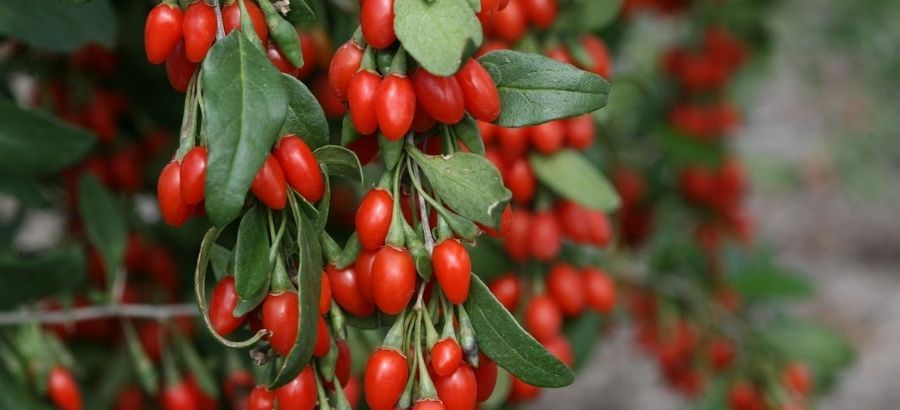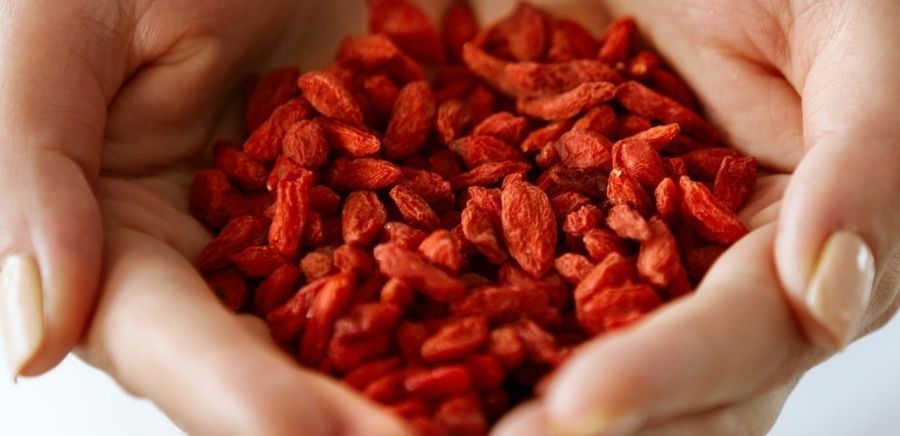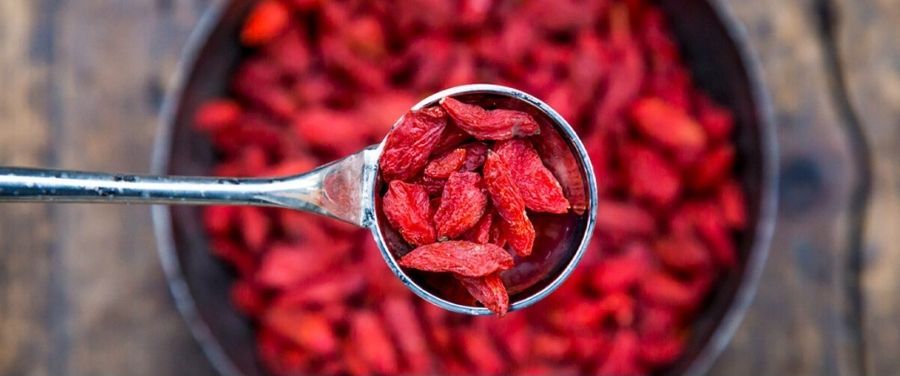What is Goji Berry?
Goji berry is definitely a small red fruit but its health benefits will really make surprise you. Due to its ultimate nutrition value, today this sour—sweet fruit is attracting everyone’s attention. Goji berries are not only delicious to eat, but they also contain plenty of nutrients. The scientific name of goji berry is Lycium Barbarum. Goji Berry is also known as wolfberry and goji. Its Chinese name is Ningxia gǒuqǐ (宁夏枸杞 | 寧夏枸杞).
Common names of the plant in English may include Chinese boxthorn, Chinese wolfberry, mede berry, Himalayan goji, Tibetan goji, barbary matrimony vine, matrimony vine or red medlar.
It is believed that the regular consumption of goji berry fruit provides many health advantages; including protecting against heart disease, diabetes and cancer. Due to these properties, it is also known as “SUPERFOOD”. (SEE ALSO: How Acai Berries are Good for Your Health)
It has been in continuous use in its dried form in Chinese medicine for more than 2,000 years.
Origin of Goji Berry
Goji berry fruit is native to China. This fruit requires extremely cold weather and is found extensively in the Himalayan region. It mainly grows in the lower regions of the Himalayas in India.
However, goji berry is typically grown in most parts of the world. Today, it is also cultivated in United States of America, United Kingdom and Australia.

Goji berry tree grows to a height of approximately 3 to 10 feet.
Goji Berry Nutritional Value
Per 100 gram serving of goji berry (Tibetan) provides —
- 11 gram protein
- 8 gram dietary fiber
- 9000 IU vitamin A
- 19.2 mg vitamin C
- 100 mg calcium
- 9 mg iron
- 840 mg potassium
- 2.7 mg zinc
- 2 mg copper
- 24 mg sodium
- 1.3 mg riboflavin
- 21 gram total carbohydrates
15 Health Benefits of Goji Berries
Along with keeping the eye nerves safe, this fruit also protects against many cardiovascular diseases. According to many scientific studies goji berry is also beneficial for many internal organs of the body. Goji berry health benefits may include —
1. Provides Instant Energy:
Goji berries are energy powerhouse. Per 100 gram serving of goji berry provide about 1461 kilojoules of energy and about 40% of its total energy comes from carbohydrates. So if you consume goji berries before an intense workout, then it can be a good choice to stay energetic while exercising.
2. In Diabetes:
Goji Berry is extremely beneficial for the patient with diabetes. Even though it is naturally sweet, it helps to control blood sugar levels.
Some scientific research held on animals have shown that goji berries can play a vital role in lowering blood sugar levels. It contains polysaccharides ( long chains of monosaccharides) that works to reduce blood sugar. Goji berries can also be beneficial for the patients with type—2 diabetes.
3. Protect Against Cancer:
According to a 2011 study of Ningxia University in China, goji berry contains a special type of vitamin called 2-O-β-D-glucopyranosyl-L-ascorbic acid, which helps to prevent cervical cancer cells to grow.
An another study found that goji berry can play an important role in preventing the growth of HT-29 cells of colon cancer.
According to an another report published in the Journal of Drug Design, Development and Therapy, goji berry helps to prevent the development of tumors and promote the healing process.
Vitamin A and vitamin C found in berries offer antioxidant benefits and can prevent cancer to some extent. They also help in preventing skin cancer.
4. Promotes Weight Loss:
Goji berries are low in fat and calories and rich in many healthful nutrients. This is the reason that they can find a place in your weight loss diet plan. In addition to this, goji berries have a low glycemic index, which is why eating them can help to reduce cravings for sugary foods and aid in weight loss. Reports show that consuming low—glycemic diet can promote weight loss.
Like most fruits and vegetables, berries are also rich in fiber. Fiber helps to promote satiety and prevents binging. And, in this way can contribute to weight loss. (SEE ALSO: How Cumin Water (Jeera Water) is Beneficial for Rapid Weight Loss)
According to an another study, goji berries can increase energy expenditure and reduce waist circumference in overweight people. Only after consuming this small fruit for 2 consecutive weeks, the result will be visible to you.
5. Reduce Blood Pressure:
The polysaccharides found in goji berries are known for their anti-hypertensive properties. These berries have also been used in traditional Chinese medicine to regulate blood pressure levels.
According to a Chinese study, the polysaccharides contents of berries can help to lower blood pressure levels.
According to an another study, consuming berry or goji berry juice can help to control blood pressure of the people with high blood pressure. If the patient with hypertension drink 1 or 2 glass of goji berry juice regularly for about a month, then it helps to reduce their blood pressure levels to some extent.
6. Boost Vision Health:
Goji berries are rich in zeaxanthin, which is known for eye health. Zeaxanthin is an antioxidant helps to prevent eye damage to some extent. It is also considered as a natural treatment for age—related macular degeneration.
The zeaxanthin in the berries also protects the eyes from UV exposure, free radicals, and various other forms of oxidative stress.

Consuming goji berry juice daily for about ninety days can help to increase plasma zeaxanthin concentration and can protect the eye from hypopigmentation and oxidative stress that can damage the macula.
Vitamin A found in goji berries also has some neuro—protective properties. It means that it provides protection to the nerves of your eyes. Vitamin A contains an element called beta carotene, which help to protect the retina and nerve cells.
7. Improved Lung Health:
According to a scientific research, taking goji berry supplements for about a month may reduce inflammation in the lungs and can increase white blood cell (WBC) activity against lung diseases such as influenza.
Goji berries can also help to boost immune system, which has a desirable impact on the lung health. This property can also work to treat respiratory diseases such as asthma.
8. Help to Balance Hormones:
Research have been revealed that goji berries can also be used to cure yin deficiency and may help to restore and balance hormones.
9. In Sexual Health:
Many research have been shown that goji berries may boost testosterone hormone levels in men, thereby improving their fertility and sexual health. It can also work as a an effective and alternative remedy for erectile dysfunction (ED) or impotence.
Research also states that it can exhibit fertility—enhancing effects in men. (SEE ALSO: Viagra Foods : 7 Foods That Act Like A Natural Viagra)
10. Fight Against Depression:
Goji berries contain vitamin B and vitamin C in plenty. It is also rich in manganese and fiber. All of these nutrients help to enhance energy levels and work to enhance positivity. Wolfberries are also used in many Chinese medicines to treat depression, anxiety and other mood disorders.
A research states that regular consumption of goji berry juice can boost energy levels and enhance your mood. (SEE ALSO: Antidepressants Working, Side-Effects, Uses and Effectiveness)
11. Detoxifies Your Liver:
Berries along with other medicinal herbs such as ganoderma and licorice may help to detoxify your liver. It also benefits your kidney and liver and help to restore the strength and vitality.
It is also believed that goji berry can work as a natural remedy for kidney stones. However, more research are needed in this regard.
12. Promotes Heart Health:
Goji berries contain significant amounts of anthocyanins, polyphenols, micronutrients and fibers. All these nutrients help to reduce the risk of heart disease. (SEE ALSO: Heart Healthy Foods : Top 10 Foods for a Healthy Heart)
Anthocyanins are a type of antioxidants, which are responsible for giving red color to goji berries. Goji berries also help to reduce the amount of low—density lipoproteins or “bad cholesterol” which may lead to high blood pressure (hypertension), blood vessel blockage and atherosclerosis.
13. May Help to Prevent Neurological Disorders:
It is also believed that wolfberries can also help in preventing nervous disorders, such as Parkinson’s disease and Alzheimer’s disease.
It also works to reduce glutamate toxicity, which is also known as excitotoxicity. It is a process in which neurons of the brain are damaged and destroyed. Many mental disorders may develop in this condition. In normal functioning, glutamates send signals to the nerve cells, which help a person to learn new things and keep memory.
14. For Skin:
As we have previously describe in this article that goji berries are rich in beta-carotene. Beta-carotene is an essential ingredient that work to promote skin health and gives a glowing and youthful skin. It is also beneficial in reducing skin damage and skin irritation, protects against harmful UV rays and helps to inhibit the aging process. (SEE ALSO: Loose Skin Tightening : Effective Home Remedies For Loose Skin)
Goji berry also contains vitamin C and healthy amino acids. All of these nutrients help to improve complexion and make your skin glowing. You can include the berries in your daily diet. In addition, wolfberries also has anti—inflammatory properties, which help to reduce acne breakouts.
15. Boost Hair Growth:
Goji berries are rich in vitamin A and vitamin C. Vitamin A helps to enhance blood circulation to the scalp, thereby increasing hair growth and preventing hair fall.
Vitamin C works to enhance the absorption process of iron in the body. Iron plays a vital role in hair growth. (SEE ALSO: Natural Hair Straighteners : 7 Ways to Straighten Your Hair Naturally)
Side-Effects of Goji Berry Fruit
However, goji berry fruit is full of healthful nutrients, but it also may have some health side-effects; including —
- Some individuals may be allergic to goji berry fruit.
- Goji berries might interact with certain drugs and medications. These medicines may include warfarin, diabetes medicines and medications to treat high blood pressure.
- Pregnant women are advised to stay away from this fruit as it may lead to miscarriage. If you are breast—feeding, ask your doctor first. (SEE ALSO: Pregnancy Food : What to Eat and What to Avoid During Pregnancy)
Take Away
Goji berries are delicious in taste and are rich in many healthful antioxidants, vitamins and minerals. But, this fruit should be eaten in a limited quantity according to their age, health and other factors, even though it is tasty and rich in nutrients.
Some people may also be allergic to it, if you or someone close to you is feeling symptoms such as itching, burning or redness, then it should be discontinued at the same time. If the situation seems serious, immediately see your doctor or health care provider.
REFERENCES:
- United States Department of Agriculture; Full Report (All Nutrients): Goji berries, dried; National Nutrient Database for Standard Reference Legacy Release; Agricultural Research Service.
- Goji Berries as a Potential Natural Antioxidant Medicine: An Insight into their Molecular Mechanisms of Action; Authors: Zheng Feei Ma, Hongxia Zhang, Sue Siang Teh, Chee Woon Wang, Yutong Zhang, Frank Hayford, Liuyi Wang, Tong Ma, Zihan Dong, Yan Zhang, and Yifan Zhu; PMCID: PMC6343173, PMID: 30728882; doi: 10.1155/2019/2437397.
- Berries: emerging impact on cardiovascular health; Authors: Arpita Basu, Michael Rhone, and Timothy J Lyons; PMCID: PMC3068482, NIHMSID: NIHMS171310, PMID: 20384847; doi: 10.1111/j.1753-4887.2010.00273.x.
- Selective suppression of cervical cancer Hela cells by 2- O-β-D-Gluchopyranosyl-G Ascorbic-Acid Isolated From The Fruit Of Lycium Barbarum L; Authors: Zhiping Zhang, Xiaoming Liu, Tao Wu, Junhong Liu, Xu Zhang, Xueyun Yang, Michael J Goodheart, John F Engelhardt, Yujiong Wang; PMID: 20717715. DOI: 10.1007/s10565-010-9174-2.
- Goji; MedlinePlus Medical: US National Library of Medicine.
- A Systematic Review of the Efficacy and Safety of Anti-aging Herbs in Animals and Human; Authors: Shirin Hasani-Ranjbar, Somayeh Khosravi, Neda Nayebi, Bagher Larijani and Mohammad Abdollahi; DOI: 10.3923/ajava.2012.621.640.
- A randomized, double-blind, placebo-controlled, clinical study of the general effects of a standardized Lycium barbarum (Goji) Juice, GoChi; Authors: Harunobu Amagase, Dwight M Nance; PMID: 18447631, DOI: 10.1089/acm.2008.0004.
- Practical Application of Antidiabetic Efficacy of Lycium barbarum Polysaccharide in Patients with Type 2 Diabetes; Authors: Huizhen Cai, Fukang Liu, Pingguo Zuo, Guiling Huang, Zhixiu Song, Tingting Wang, Huixia Lu, Fei Guo, Chao Han, Guiju Sun; PMID: 25381995, PMCID: PMC4475782, DOI: 10.2174/1573406410666141110153858.
- An evidence-based update on the pharmacological activities and possible molecular targets of Lycium barbarum polysaccharides; Author: Jiang Cheng, Zhi-Wei Zhou, Hui-Ping Sheng, Lan-Jie He, Xue-Wen Fan, Zhi-Xu He, Tao Sun, Xueji Zhang, Ruan Jin Zhao, Ling Gu, Chuanhai Cao, Shu-Feng Zhou ; PMID: 25552899, PMCID: PMC4277126, DOI: 10.2147/DDDT.S72892.
- Anticancer effect of ethanol Lycium barbarum (Goji berry) extract on human breast cancer T47D cell line; Authors: Anna Wawruszak, Arkadiusz Czerwonka, Karolina Okła, Wojciech Rzeski; PMID: 26525080. DOI: 10.1080/14786419.2015.1101691.
- 10-Day green smoothie cleanse; Author: JJ Smith; 5 Reasons You Can’t Lose Weight.
- Lycium barbarum increases caloric expenditure and decreases waist circumference in healthy overweight men and women: pilot study; Author: Harunobu Amagase and Dwight M Nance; PMID: 22081616, DOI: 10.1080/07315724.2011.10719973.
- Anti-hypertensive effect of Lycium barbarum L. with down-regulated expression of renal endothelial lncRNA sONE in a rat model of salt-sensitive hypertension; Authors: Xinyu Zhang, Xinping Yang, Yahui Lin, Miaomiao Suo, Ling Gong, Jingzhou Chen and Rutai Hui; PMCID: PMC4525921, PMID: 26261587.
- Goji berry effects on macular characteristics and plasma antioxidant levels; Author: Peter Bucheli, Karine Vidal, Lisong Shen, Zhencheng Gu, Charlie Zhang, Larry E Miller, Junkuan Wang; PMID: 21169874. DOI: 10.1097/OPX.0b013e318205a18f.
- An evidence-based update on the pharmacological activities and possible molecular targets of Lycium barbarum polysaccharides; Authors: Jiang Cheng, Zhi-Wei Zhou, Hui-Ping Sheng, Lan-Jie He, Xue-Wen Fan, Zhi-Xu He, Tao Sun, Xueji Zhang, Ruan Jin Zhao, Ling Gu, Chuanhai Cao and Shu-Feng Zhou; PMID: 25552899, PMCID: PMC4277126. DOI: 10.2147/DDDT.S72892.
- Immunomodulatory effects of a standardized Lycium barbarum fruit juice in Chinese older healthy human subjects; Authors: Harunobu Amagase, Bixuang Sun, Dwight M Nance; PMID: 19857084, DOI: 10.1089/jmf.2008.0300.
- Biomolecular and Clinical Aspects of Chinese Wolfberry; Author: Peter Bucheli, Qiutao Gao, Robert Redgwell, Karine Vidal, Junkuan Wang, and Weiguo Zhang.
- The protective effect of goji berry extract in ischemic reperfusion in testis torsion; Authors: Recep Dursun, Yılmaz Zengin, Ercan Gündüz, Mustafa İçer, Hasan Mansur Durgun, Mansur Dağgulli, İbrahim Kaplan, Ulaş Alabalık and Cahfer Güloğlu; PMCID: PMC4402873. PMID: 25932226.
